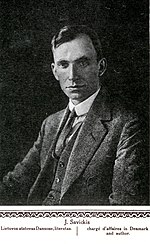Jurgis Savickis, Date of Birth, Place of Birth, Date of Death
TweetJurgis Savickis
Lithuanian writerAbout Jurgis Savickis
- Jurgis Savickis (4 May 1890 – 22 December 1952) was a Lithuanian short story writer and diplomat representing interwar Lithuania mostly in the Scandinavian countries. Born to a family of well-off Lithuanian farmers, Savickis attended a gymnasium in Moscow and studied painting at the School of Fine Arts in Kraków.
- During World War I, he was sent as a delegate of the Lithuanian Society for the Relief of War Sufferers to Denmark to care for Lithuanian POWs in Germany.
- After the war, he was recognized as the official Lithuanian representative in Denmark and later in Norway and Sweden.
- In 1923–1927, he was posted in Finland.
- In 1927–1929, he worked in Kaunas as the director of the Law and Administration Department of the Ministry of Foreign Affairs and as director of the Kaunas State Drama Theatre.
- He returned to the diplomatic service and represented Lithuania in Sweden (1930–1937), Latvia (1937–1938), and the League of Nations (1938–1940).
- After the Soviet occupation of Lithuania in June 1940, Savickis retired in his villa in Roquebrune-Cap-Martin near Monaco in the South of France. During his life, Savickis published three collections of short stories, one novel, and four travel books.
- He was one of the first to introduce literary modernism (with elements of Expressionism, Impressionism, and Existentialism, though his works don't neatly fit any particular literary movement) to Lithuanian literature.
- As his works departed literary realism, they were not well received by contemporary critics who thought his works were too foreign and too removed from Lithuanian realities.
- Savickis, having lived abroad for most of his life, reflected aesthetics of modern Western European bourgeois.
- His works feature sharp and playful wit and irony and succinct and finely tuned sentences.
- His works were influenced by his interest in painting (abundance of colors, character sketches), theatre (characters as actors, stage setting), and film (dynamic montage of fragments).
- His narrator is an observer from a certain emotional distance that leaves it up to the reader to finish what is not said.
Read more at Wikipedia


 Date of Birth:
Date of Birth:  Place of Birth: Pagausantys, Kaunas County, Lithuania
Place of Birth: Pagausantys, Kaunas County, Lithuania